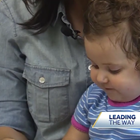Emotions – they shape our self-concept, influence relationships, impact performance and color our overall experience of the world. Despite the universality of emotional experience, a nuanced understanding of them remains elusive for many. Through their own individual research within the Department of Health Service Psychology, home to KCU's doctoral program in clinical psychology, Drs. Jennifer Fugate and Nicki Zieber are each actively working to discover deeper understandings of human emotional perception.
Social Perception in Infants
Nicki Zieber, PhD, assistant professor of Health Service Psychology, is a KCU faculty researcher who studies infant social perception and emotional development. Her journey into this specialized field began as a graduate student at the University of Kentucky. She was interested in understanding how babies perceive social objects, particularly faces and bodies, and their ability to detect and interpret emotional expressions in these objects during their first year of life. Once this early perception is understood, could strategies and interventions be developed to support healthy emotional development in infants, influencing their social outcomes as they grow into toddlers and beyond?
According to previous research, infants between three and six months of age begin to pay attention to emotional features, such as the upturned mouth associated with a smile. Through interactions with caregivers, they learn to associate these features with specific feelings based on other contextual clues from the environment, forming the basis for their emotional understanding. By seven months of age, babies are believed to have a rudimentary understanding of basic emotions such as fear and happiness. Previous research has also revealed that infants exhibit varying physiological responses, such as pupil dilation, when exposed to different emotional expressions. This indicates infants are not only capable of reading the emotions of others, but can also display appropriate physiological responses to those emotions.
Zieber’s research primarily employs behavioral methods, with a focus on the paired comparison procedure. This method involves presenting infants with two side-by-side images. In the first “familiarization” phase, the two images are the same. In this case, that might mean the same woman making the same facial expression. In the “test” phase, the researcher shows the infant two different images – one being a similar but slightly different image than what was presented in the first phase and the other a completely new image. “We’re testing to see if they recognize emotional expressions across different identities,” Zieber said. “So do they recognize fear or happiness not only on a familiar face, but also on an unfamiliar face?” Her hypothesis is that 7-month-olds can recognize expressions across identities on female faces, likely influenced by their significant exposure to female caregivers, but it remains uncertain whether they display similar responses to male emotional faces.
To measure an infant’s gaze, a special eye tracker is used. “It records exactly where the infant is looking on the screen and allows us to measure with millisecond precision and with highly accurate spatial resolution where they’re looking,” said Zieber. “The camera can also record pupil diameter, which can indicate the infant’s level of arousal.”
In a forthcoming study, Zieber plans to explore how infants perceive emotional body language. It’s known that adults have the ability to recognize emotion conveyed through the body with nearly the same accuracy as emotion conveyed through the face, but less is known about how infants perceive emotional bodies. “It may be that, for infants, faces and bodies share similar qualities and so they process them similarly,” remarked Zieber. “Or it may be that…it’s not until later, when they start moving and seeing more bodies, that they develop this ability.” Beyond this research, Zieber is presently engaged in an R00-funded study examining the rate at which infants can detect emotional faces. The R00 grant is a prestigious funding opportunity from the National Institutes of Health (NIH) that can serve as a crucial stepping stone toward securing the most sought-after NIH funding, the Research Project (R01) grant.
The implications of Zieber’s research extend beyond infancy, with a longitudinal study that started in fall 2023 that will assess how infants’ ability to detect emotions correlates with toddlers’ social skills. By following infants from three to 15 months of age, she aims to unravel how early emotion perception impacts later developmental stages. Understanding how infants perceive and interpret emotions not only contributes to the field of developmental psychology, but also holds relevance for broader societal implications.
Emotion Perception and Regulation
For Jennifer Fugate, PhD, associate professor of Health Service Psychology, her primary area of expertise lies in emotion perception and regulation; more specifically, how a person’s emotional language affects their perception of emotion in themselves and others and the impact it has on their emotional regulation. In her research lab, which she has dubbed Affect, Behavior, Learning and Embodiment (ABLE), Fugate conducts studies that involve exposing participants to emotion words and assessing how this exposure influences their perception of facial expressions.
By exposing participants to new emotion words, Fugate hopes to improve their emotional granularity, or the ability to identify and differentiate between emotions. “We know that emotional granularity is a protective factor for lots of elements of mental health,” she said. “So, people that are more granular with their vocabulary and their ability to differentiate between emotions actually suffer from less depression, less anxiety.” Researchers believe that by having more words for different emotions, individuals gain direction on how to navigate their feelings. The underlying notion is that it becomes more manageable to take action when one recognizes specific emotions such as frustration or irritation, as opposed to a vague sense of feeling bad.
In addition to her work on emotion perception, Fugate explores embodied cognition and learning. Embodied cognition posits that the brain is not solely reactive to information but is intricately linked to an individual’s actions and the environment. It might not seem controversial that people learn information through their senses and interaction with the world, but embodied cognition is in direct contrast to the theory of mind-body dualism, an idea that the mind and body work separately, which was the prevailing theory for hundreds of years. Fugate, along with co-author Sheila Macrine from the University of Massachusetts Darthmouth, have translated theoretical and empirical work on embodied notions across educational domains into a widely-praised book, "Movement Matters: How Embodied Cognition Informs Teaching and Learning" (MIT Press, 2022), which outlines how embodied cognition principles can enhance teaching practices.
At KCU, Fugate is actively researching embodied cognition. In collaboration with other KCU PsyD faculty including Nichmarie Soto Bonilla, PhD, assistant professor of Health Service Psychology, Fugate is working on creating a standardized assessment rubric. This rubric aims to gauge the influence of simulated case-based learning on students’ development in skill-based competencies and confidence over time. “We’re hoping this rubric will be used beyond our department and broaden the data collection to our medical and dental schools,” Fugate said. She expects this research will ultimately provide valuable insights into the effectiveness of embodied learning experiences.
Looking ahead, Fugate hopes to apply her research to some of KCU’s clinical population partnerships. By introducing emotional granularity concepts in an applied setting, she hopes to empower young individuals with the skills to navigate their emotions effectively. Emotional granularity can be taught to people of all ages – children, adolescents and adults – easily and cost-effectively. “What we’re learning is that there’s always hope for change,” Fugate said. “You don’t have to be a victim to your emotions; you have more power than you think. Emotions don’t happen to you. You create your emotions through what you know.”
Fugate’s research represents a fusion of theoretical exploration and practical application, contributing valuable insights to the understanding of emotion perception, language’s role in emotional regulation and the application of embodied cognition principles in education. As she navigates challenges and envisions a more research-oriented future at KCU, Fugate is at the forefront of pioneering work that has the potential to meaningfully impact mental health and education.
Discovering Emotion's Expanse
Fugate and Zieber’s research reveal thoughtful Fugate and Zieber's research reveals thoughtful insights into human emotional perception. Zieber’s studies on infant emotional development promise to inform interventions for healthy emotional growth. Meanwhile, Fugate’s work in emotion perception, regulation, and embodied cognition, particularly her focus on emotional granularity, demonstrates potential applications in mental health and education.
Both women are forging new paths of research in KCU’s Department of Health Service Psychology, their work extending beyond academia, impacting societal understanding of emotions and offering practical strategies for well-being.




(0) Comments